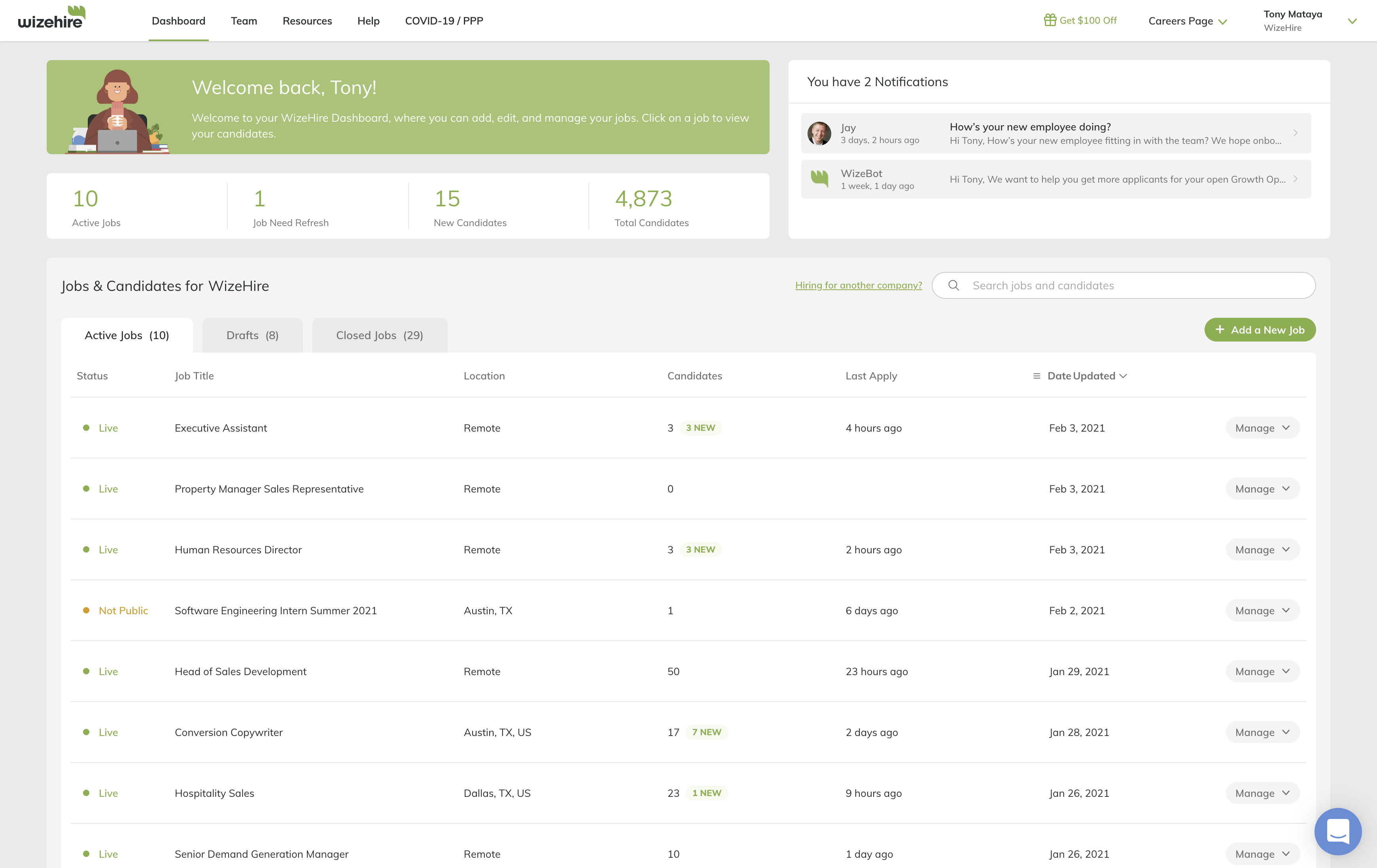WizeHire, a hiring service for small- and medium-sized (SMB) businesses, has raised $30 million in a Series B funding round led by Tiger Global with participation from Amplo and Mercury. The tranche values the company at $250 million post-money, and cofounder and CEO Sid Upadhyay says that it’ll be put toward growing WizeHire’s over-100-person headcount, expanding the company’s hiring resources and “further establish[ing]” relationships with technical partners.
COVID-19 put a strain on the labor supply chain, particularly in segments of the economy depressed by pandemic-related travel restrictions and work-from-home policies. In a 2021 survey from The Conference Board focused specifically on the service industry, 80% of respondents said they were having a hard time finding qualified workers.
With the shortfall not expected to end anytime soon, some organizations have turned to technology in search of a solution. WizeHire has been a top beneficiary. Its customers base doubled in 2021 to 15,000 employers, and sources close to the company tell TechCrunch that annual recurring revenue now stands around $10 million.

Comparing candidates in WizeHire’s dashboard.
“For our customers, the pandemic has further shed light on a need for recruiting and hiring technology,” Upadhyay told TechCrunch via email. “As an SMB-focused hiring platform — and one that was bootstrapped at the time — the early months of the pandemic were tough … [But we] expanded our services beyond hiring, including new products such as access to Paycheck Protection Program loans or small business tax credits directly within our app … [and] expanded our footprint into new industries such as mortgage and insurance.”
WizeHire was founded in 2014 by Upadhyay and Jay Niblick. Upadhyay previously cofounded Hoot.me, an app designed to let college students to add classes and collaborate with teachers and classmates on Facebook. Civitas Learning acquired Hoot.me in 2013.
With WizeHire, the goal was to address some of the major pain points that SMBs face where it comes to recruitment, according to Upadhyay. Small business owners often need help writing effective job ads, he says, as well as the the flexibility to post opportunities in more places. Statistics paint the picture: According to the latest NFIB Jobs Report, 92% of SMBs reported having few or no qualified applicants when hiring.
“Smaller businesses need to focus on growth — not keeping up on HR trends, industry statistics, or job board best practices. WizeHire does the heavy lifting to support them in finding the right talent for their business to grow,” Upadhyay said.
WizeHire differentiates itself from platforms like Gem, Otta, and Talent.com with an algorithm that guides businesses through the hiring process. Trained on resumes for skills and licenses and assessments for soft skills, the algorithm suggests compensation for the role, a specific location to post a job, and candidates based on criteria that the company has selected.
Upadhyay pitches the algorithm as a time saver, but it should be noted that these sorts of models have the potential to amplify bias in the hiring process. Amazon reportedly pulled the plug on an AI recruitment tool that, trained on resumes over a 10-year period, discriminated against women applicants. In recognition of the dangers, New York City recently passed a law that prohibits businesses from using algorithm-based systems to make hiring decisions about NYC residents without first auditing those tools for bias.
Upadhyay didn’t directly respond to a question about algorithmic bias, but he pointed out that WizeHire also provides advice from hiring and business coaches.
Beyond AI-driven suggestions, WizeHire advises clients on the difficulty of a hire in their local market based on an analysis of internal hiring data and “proprietary third-party data.” Elsewhere, WizeHire recently launched a partnership with LinkedIn to simplify the application experience on mobile devices and collaborated with Payscale, which advises small businesses on pay, to power compensation insights within the company’s platform.
Looking ahead, WizeHire plans to add background checking and candidate-to-recruiter text messaging features plus “lawyer-approved” offer letter templates for particular industries.

Image Credits: WizeHire
“Staffing firms are expensive, applicant tracking systems are built for HR experts, and job boards are time-consuming to manage for a busy business owner. Hiring challenges on Main Street are so prominent that everyday customer’s are impacted,” Upadhyay added. “Many HR tech companies tend to focus on helping enterprise companies with unlimited resources at their fingertips. WizeHire not only focuses on Main Street businesses who are underserved, but building them a unique experience for each industry vertical.”
WizeHire’s latest financing round — which brings its total raised to $37.5 million — comes amid a flurry of venture capital investments in HR tech platforms spurred by pandemic-era challenges. Last year, venture investors funneled more than $12.3 billion into global HR tech startups — roughly 3.6x the amount of capital invested in 2020, according to PitchBook.

